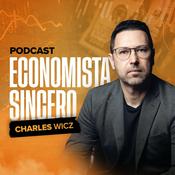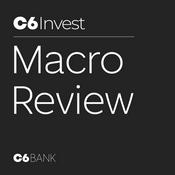The Decisive Podcast: Insights and analysis to empower confident decision-making.
S&P Global Market Intelligence

Último episódio
306 episódios
- In this episode, taken from a Feb. 4 client webinar, host Kristen Hallam, along with experts John Raines, Jack Kennedy, and Jeffery McElroy, dive into the complexities of geopolitical volatility around the globe.
As tensions rise over Iran's nuclear ambitions and the U.S. military strategy, the discussion explores potential pathways to escalation and their global implications. Discover how military and diplomatic maneuvers could impact critical sectors like energy and infrastructure, with disruptions potentially affecting global oil prices and economic stability.
The conversation also extends to Latin America and the strategic interests of mainland China, examining how shifts in U.S. policy influence regional security and economic partnerships.
Join us for an insightful analysis of the geopolitical landscape, offering valuable perspectives for businesses and policymakers navigating these turbulent times. Subscribe now to stay informed with The Decisive—your source for empowering decision-making in an uncertain world.
More S&P Global Market Intelligence Content:
Age of Agility: Key Themes Shaping the MENA Region in 2026
Age of Agility: Key Themes Shaping Latin America in 2026
Age of Agility: Key Themes Shaping APAC in 2026
Click here to subscribe to our Geopolitical and Economic Risk Monthly newsletter.
For S&P Global subscribers (login required):
MENA regional conflict
Japan's political outlook
2026: The age of agility
Credits:
Host: Kristen Hallam
Guests: John Raines, Jack A. Kennedy, Jeffery McElroy
Produced By: Debbie Taylor, Kristen Hallam
Edited By: Marz Marcello
Published With Assistance From: Sophie Carr, Feranmi Adeoshun - Agentic AI can move supply chains from reactive "triage" to smarter, faster decision-making. In this episode of The Decisive, S&P Global Market Intelligence's Brendan Neary joins host Kristen Hallam to unpack today's biggest supply-chain pain points—volatility, complexity, and constant disruption driven by forces like weather, policy shifts, and geopolitics—and why risk mitigation has become a daily mandate for procurement and supply-chain leaders.
You'll hear how agentic AI—autonomous systems powered by large language models—can help teams connect disparate data, reason through scenarios, and take action with minimal supervision, turning raw information into practical workflows and recommendations.
The conversation dives into data-driven procurement and sourcing, including how organizations can use intelligence to benchmark negotiations, identify alternate suppliers, and assess country and credit risk—while addressing the real-world deployment hurdles of data quality, interoperability, and making insights truly consumable for decision-makers.
Listen now to gain insight into how agentic AI can transform supply chain management.
Click here to register for TPM26, the world's largest container shipping conference.
More S&P Global Market Intelligence Content:
Supply chain certainty, rather than price, will shape shipping in 2026
Age of Agility: Corporate Supply Chain Strategy Themes in 2026
Top 10 Economic Insights 2026
For S&P Global subscribers (login required):
Egypt opens new semiautomated Red Sea terminal as Suez traffic grows
Global trade outlook and supply chains
2026: The age of agility
Credits:
Host: Kristen Hallam
Guest: Brendan Neary
Produced By: Kristen Hallam
Edited By: Marz Marcello
Published With Assistance From: Sophie Carr, Feranmi Adeoshun - Stablecoins are designed to keep a steady value—by pegging to a reserve asset like the US dollar—while delivering the speed and lower cost of blockchain-based payments. In this episode of The Decisive, S&P Global Market Intelligence economist Robert Matthee unpacks how stablecoins work, why their market has surged to an estimated $300 billion, and what's driving forecasts that the space could expand dramatically in the coming years.
Robert and host Kristen hallam dig into what's powering adoption: demand for cheaper cross-border transfers, growing use by major issuers, and the impact of clearer regulation—including the US GENIUS Act—on mainstream acceptance.
We also look at stablecoins through the lens of emerging markets, especially sub-Saharan Africa, where FX shortages, inflation, and friction-filled payment rails have made "digital hard currency" an appealing alternative for households and businesses. The episode also explores the tradeoffs—how widespread stablecoin use could accelerate currency substitution, weaken domestic monetary policy, and pressure local banks by pulling deposits out of the traditional system.
Finally, we close with what could come next—from continued growth in dollar-backed coins to new experiments, including stablecoins backed by assets like gold.
Listen now to gain insights on the future of stablecoin adoption.
More S&P Global Market Intelligence Content:
Stablecoins Explained: A Comprehensive FAQ Guide to Digital Currency Stability
Age of Agility: Key Themes Shaping the Sub-Saharan Africa Region in 2026
Top 10 Economic Insights 2026
For S&P Global subscribers (login required):
Sub-Saharan Africa: FX shortages likely to accelerate US stablecoin adoption
Banking risk 2025 highlights and 2026 outlook
Fiscal fragilities: Dealing with high debt
Credits:
Host: Kristen Hallam
Guest: Robert Matthee
Produced By: Kristen Hallam
Edited By: Marz Marcello
Published With Assistance From: Sophie Carr, Feranmi Adeoshun - The US Federal Reserve is always in the spotlight, and that spotlight is brighter than ever in 2026.
In this episode of The Decisive, economist Lawrence Nelson, our resident Fed expert at S&P Global Market Intelligence, breaks down why the central bank is widely expected to keep interest rates steady at its January meeting, and what "sticky" inflation could mean for the first part of the year.
We also examine the leadership uncertainty ahead of Jerome Powell's term as Fed chair ending in May, including how a US Justice Department investigation could complicate the transition—without necessarily changing the Fed's data-driven approach to monetary policy.
The episode offers a quick refresher on the Fed's dual mandate, the key indicators policymakers watch, and how disruptions—such as last year's government shutdown—can impact the data flow the Federal Open Market Committee (FOMC) relies on when setting rates.
Listen now to learn more about what our Fed expert is watching in January and beyond, and gain insights to guide your business decisions in the year ahead.
More S&P Global Market Intelligence Content:
Listen: The Decisive | Episode 13 - How US Monetary Policy Works
Top 10 Economic Insights 2026
The Age of Agility: Key Themes for 2026
For S&P Global subscribers (login required):
Weekly Economic Commentary
Inflation indications
Bubble trouble: Lessons from the dotcom days
Credits:
Host: Kristen Hallam
Guest: Lawrence Nelson
Produced By: Kristen Hallam
Edited By: Marz Marcello
Published With Assistance From: Sophie Carr, Feranmi Adeoshun - As global trade faces unprecedented disruption, shippers must rethink everything from cost containment to risk management. In this episode of the Decisive Podcast, host Kristen Hallam sits down with Peter Tirschwell, Vice President for Maritime & Trade at S&P Global Market Intelligence and TPM Conference founder, to break down the theme of TPM26: "Taking Costs Out, Putting Value In."
Together, they explore the far-reaching impacts of U.S. tariff policies, evolving supply chain strategies, and the role of technology in managing costs. Peter shares vital insights on balancing freight rates with service reliability, current best practices for shippers, and what to expect from this year's TPM Conference—including highlights on macroeconomic trends, industry consolidation, and the current dynamics of global shipping.
Whether you're a shipper, carrier, supply chain manager, or simply curious about the forces shaping global trade, this episode will help you navigate industry trends and challenges.
Tune in for an inside look at the biggest topics captivating the container shipping industry in 2026.
Click here to register for TPM26, the world's largest container shipping conference.
More S&P Global Market Intelligence Content:
Asia-Europe ocean carriers add capacity as trade enters peak shipping period
Geopolitical Risk Brief: December 2025
Top 10 Economic Insights 2026
For S&P Global subscribers (login required):
Egypt opens new semiautomated Red Sea terminal as Suez traffic grows
Global trade outlook and supply chains
2026: The age of agility
Credits:
Host: Kristen Hallam
Guest: Peter Tirschwell
Produced By: Kristen Hallam
Edited By: Marz Marcello
Published With Assistance From: Sophie Carr, Feranmi Adeoshun
Mais podcasts de Negócios
Podcasts em tendência em Negócios
Sobre The Decisive Podcast: Insights and analysis to empower confident decision-making.
Whether you're a business leader, investor, or simply curious about the forces shaping our world, The Decisive podcast is here to provide you with the knowledge you need to stay ahead. Join our team of seasoned Market Intelligence analysts as they explore the ever-changing landscape of maritime, trade and supply chain, economics and country risk.
Site de podcastOuça The Decisive Podcast: Insights and analysis to empower confident decision-making., The Diary Of A CEO with Steven Bartlett e muitos outros podcasts de todo o mundo com o aplicativo o radio.net

Obtenha o aplicativo gratuito radio.net
- Guardar rádios e podcasts favoritos
- Transmissão via Wi-Fi ou Bluetooth
- Carplay & Android Audo compatìvel
- E ainda mais funções
Obtenha o aplicativo gratuito radio.net
- Guardar rádios e podcasts favoritos
- Transmissão via Wi-Fi ou Bluetooth
- Carplay & Android Audo compatìvel
- E ainda mais funções


The Decisive Podcast: Insights and analysis to empower confident decision-making.
Leia o código,
baixe o aplicativo,
ouça.
baixe o aplicativo,
ouça.




































![Podcast ED Podcast [@arthurdantaslemos]](https://br.radio.net/podcast-images/175/segredos-financeiros.jpeg?version=ac63156cee8abb7db20dcb281cc6f2cb16819488)


